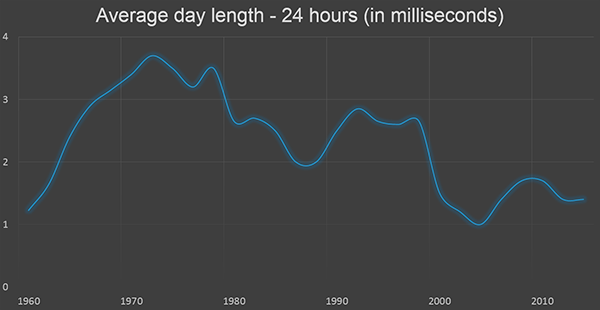Was this night the longest night in Earth's history?
This night December 21st-22nd, was the longest night of the year. However, was it also the longest night in Earth’s history as many websites reported?
The answer to this question is not as simple as it may seem at first. Indeed this question is a good illustration that the “school” solution is often very different to what is happening in real life.
Many websites reported yesterday that the night between December 21st and 22nd would be not only the longest night of the year but also the longest night in Earth’s history. The arguments they used to come to this conclusion were quite reasonable.
The moon’s pull creates tides. This video explains why it happens in two minutes:
Such tides gradually slow the Earth’s rotation. For example, a day was only 23 hours when dinosaurs lived 200 million years ago. A day become shorter about 20 seconds every million years because of friction caused by the tides. Keep in mind that moon’s gravitation creates tide waves not only in the oceans but in Earth crust as well. Earth causes tide deformation of Moon as well. Since Earth is much bigger than Moon the tides friction is stronger. This friction not just slowed the Moon but has completely stopped it. That is why we always see only one side of the Moon. This side:
Such tides gradually slow the Earth’s rotation. For example, a day was only 23 hours when dinosaurs lived 200 million years ago. A day became shorter about 20 seconds every million years because of the friction caused by the tides. Keep in mind that the moon’s gravitation creates tide waves not only in the oceans but also in Earth’s crust as well. Earth causes tide deformation of the Moon as well. But because the Earth is much bigger than the Moon the tides’ friction is stronger. This friction not just slows the Moon but has completely stopped it. That is why we always see only one side of the Moon. This side:

Since the tides caused by the Moon’s gravitation slow the Earth’s rotation each next year the longest night will be longer. Using this logiс, the website concluded that the passed night was the longest ever.
Nevertheless, the tide effect is not the only effect that changes Earth rotation speed. There are others. Do you remember how a figure skater slows his rotation when he moves his arms apart? Redistribution of Earth’s mass changes its rotation speed in a similar way. This effect could be bigger that the tide effect in shorter term. That is what we observe right now, Earth rotation speeds up last decades.

This data indicates that the last night was not the longest in Earth’s history. According to the data, the longest night was one in 1912. What could be a reason for Earth’s mass redistrbution?
One of such reason could be global warming and melting of ice caps at the poles, which leads to redistribution of the Earth’s mass from the poles to the Equator. This effect is similar to moving hands apart by a figure skater. However, it will slow down Earth rotation while we observe rotation speeding up. You cannot claim global warming here. There are other huge mass movements like continental drift that moves huge masses from the Equator to the poles. I do not know what is particular responsible here. But we can conclude based on the observations that there must be some mass redistributions that speeds up Earth rotation despite other effects like global warming and tides slow it down.
This is a good lesson for us showing that real life is often much more complicated than simple models.
See also

CASE STUDY - 8th Grade students at St Timothy's Catholic School use MEL Chemistry to enhance their science lessons
Saint Timothy Catholic School in Mesa is committed to promoting academic excellence in each child it looks after. They encourage self-discipline, self-respect, and respect for others. They understand the importance of engaging students in a comprehensive and relevant curriculum. As a result, the middle school science teacher from St. Timothy Catholic School is using MEL Chemistry subscriptions to enhance and expand their range of learning activities.

CASE STUDY - MEL Chemistry allowing pupils to reach their full potential
The Empower Learning Center is the Alternative Learning Program (ALP) within the Hinckley-Finlayson School District. They offer non-traditional education options for students ages 16-21 in their daytime program, night school for traditional high school students who need to make up credits, and night school for adults 18 and older who would like to complete their diploma or equivalency.
The school was seeking engaging, hands-on chemistry kits to make their science classes more interactive, and to help their students understand key science concepts and achieve their full potential in chemistry.

CASE STUDY - MEL Chemistry at Lund International School, Sweden
Emma Taylor, a science teacher at Lund International School (Sweden), has chosen MEL Chemistry sets as the best option for her students’ science classes. In Lund International School, all programmes are taught in English, and having chemistry sets in English are a great asset to accompany science classes.
Here, Emma shares her experience of how MEL Chemistry sets improved her students’ comprehension and understanding of science concepts.